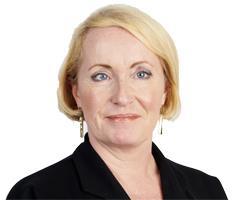Fiona Fletcher-Smith wrote to Gove regarding ‘comments and accusations’ made against housing associations in a letter from Sir George Howarth MP
The chair of the G15, has written an open letter to Michael Gove rebutting claims by an MP and campaigners that housing associations are “benefitting” from service charges and overcharging tenants.

Fiona Fletcher-Smith, chief executive of L&Q and chair of the G15
In the letter, Fletcher-Smith, chief executive of L&Q, emphasised that housing associations are charitable organisations, and “do not make a profit from service charges”.
She added that members of the G15 group of London’s largest housing associations “were deeply concerned to read service charge issues being described as a ‘form of abuse’ and […] ‘a new form of benefit fraud’”.
On 10 April, Labour MP Sir George Howarth sent a letter to Gove which was signed by a further 34 MPs. The letter stated that the Social Housing Action Campaign (SHAC) and their campaign partners, Find Others, have collected evidence “which demonstrates that almost all service charge accounts are riddled with inaccuracies”.
>> See also: Government and BSR warn against ‘unacceptably high’ service charges for building safety case reports
>> See also: G15 calls for £15bn a year in AHP grant funding amid steep drop in starts
The letter added that in most cases this leads to overcharging rather than undercharging of service charges, and that “sometimes housing association benefits, sometimes it is a sub-contractor”.
Howarth’s letter refers to this as a “scandal” that “also represents a new form of benefit fraud”.
At the beginning of each year, Fletcher-Smith said that housing associations provide tenants with an estimate of their service charges based on the most recent costs available from their own organisations or, in many cases, the external managing agent.
She said they try to make estimates “as realistic as possible, to avoid the need to recover higher amounts at the end of the year”.
She added: “We fully appreciate that increases, errors and inconsistencies are unwelcome and incredibly frustrating for residents, and so we do all we can to ensure charges are both accurate and reasonable”.
Fletcher-Smith explained that if registered providers overestimate service charges, they refund tenants at the end of the year.
The letter stated that G15 landlords are committed to delivering services that are “good quality and good value for money”.
However, the correspondence outlines that according to research by the Property Institute, service charges have nearly doubled since 2019, “driven by several specific increases that are beyond the control of housing associations”.
These include the 92% rise in building insurance costs, a 73% increase in utilities costs and professional fees that housing associations pay to various organisations, which have gone up by 69%.
The letter also states that new building safety legislation has added an average of £177 a year to each resident’s service charge.
On building insurance costs, the letter states: “Despite housing associations investing hundreds of millions of pounds to address building safety and quality issues, many insurance companies that used to insure our sector have left the market. This has led to less competition, risk aversion and soaring prices”.
It adds that the G15 “would very much welcome government support to address this critical concern. Support could include the government acting as the re-insurer of last resort to reduce premiums and service charge costs.”
Fletcher-Smith says “G15 members accept that changes need to be made to the way service charges are set, collected and how we respond to queries about them, and improvement plans are being urgently implemented to address this”.
However, she adds that housing associations provide invoices for service charges every year and that service charges are subject to formal complaint procedures if a tenant is not satisfied with explanations or evidence provided.
She also stated that leaseholders have the right to challenge the reasonableness of any service charges under Section 27a of the Landlord and Tenant Act 1985.











No comments yet